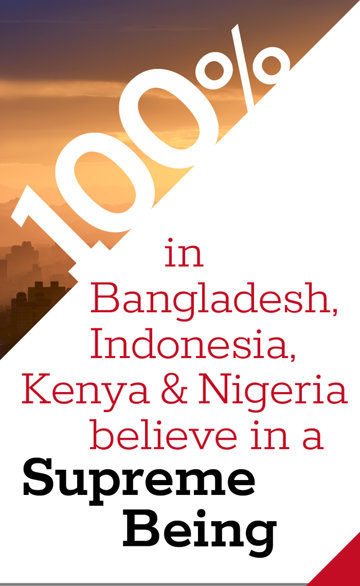Spirit: An animating or vital principle held to give life to physical organisms. Etymology: Latin spiritus, literally, “breath,” from spirare “to blow, breathe.”
The three dozen countries covered represented a wide range of religious traditions. No matter. Majorities of adults, for example, say that animals can have spirits or spiritual energies—including 83 percent of Hindu-majority India, 81 percent of Muslim-majority Türkiye, 76 percent of Christian-majority Argentina and 70 percent in Jewish-majority Israel.
Possibly the biggest surprise overall is that young people score just as high as older ones on the spiritual barometer.
Majorities, too, believe that parts of nature (such as mountains, rivers or trees) can have a spirit or a spiritual component. Nearly three quarters of Christian-majority Chile believe it, as do 73 percent of Buddhist-majority Thailand and 57 percent of Muslim-majority Indonesia.
The same goes for life after death. Though beliefs on what happens after death vary across religions—from reincarnation to heaven and hell—that it happens is a matter of worldwide consensus. When it comes to belief in some form of afterlife, most adults in most countries say yes, with those in Latin American and sub-Saharan Africa in the lead. Most Christians and Muslims believe the same—with Buddhists and Hindus being the most likely to believe specifically in reincarnation.
One rare divide the researchers found was gender. Women more than men believe they will continue living in some form after death, especially in European countries surveyed.
God proved to be slightly more controversial as a subject to the Pew poll takers, with divides like education showing in more vivid relief than in the other spiritual subjects surveyed. Generally, more educated adults tend to be less likely to believe in God, with the difference most pronounced in Israel, where there is a 19 percentage point difference between those with more than a high school education and those who ended their schooling shortly after their senior prom.

Age, too, plays its part in a belief in God, with older adults more prone to believe Someone is out there. The greatest disparity is in Hungary, where younger people, ages 18–34, believe at the rate of 44 percent, while those 50 and older believe at the rate of 72 percent, representing a 28 percentage point differential—the largest spiritual age gap in the survey.
Still, overall, most of us believe in a Supreme Being, with some countries—Bangladesh, Indonesia, Kenya, Nigeria—clocking in at 100 percent, and only Australia, Netherlands, South Korea, Japan and Sweden registering at less than 50. (But even there, Australia and the Netherlands are at 49 percent, South Korea at 47 percent and Japan at 46, with Sweden bringing up the rear at 33 percent.)
Possibly the biggest surprise overall is that young people score just as high as older ones on the spiritual barometer. While older adults are more likely to identify with a religion, attend services, pray regularly and observe rituals, when the spirit is factored in, younger adults are right in there pitching.
In fact, younger adults, ages 18–34, are more likely to believe that animals have spirits, and in 10 countries, they are more likely than their elders to say yes to “people will be reborn in this world again and again.”
With this, Pew’s most comprehensive religious and spiritual survey yet, we can take comfort that, with all the twaddle and rubbish in the world, the spiritual side of our species is in good hands for the foreseeable future.






















